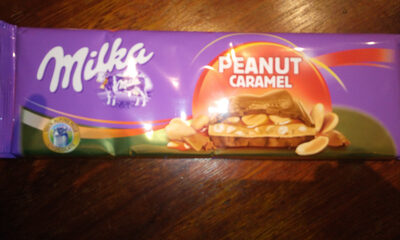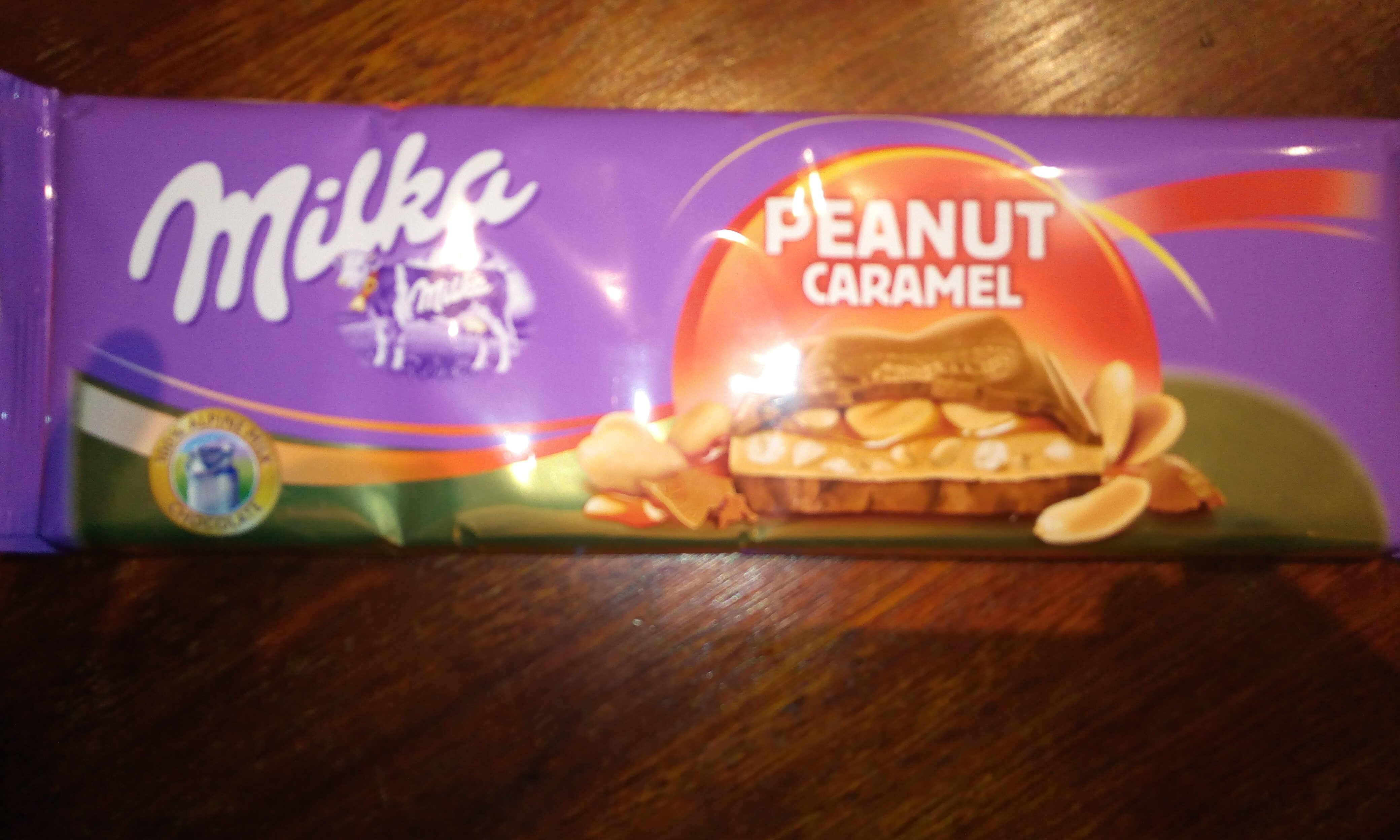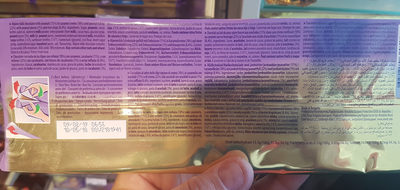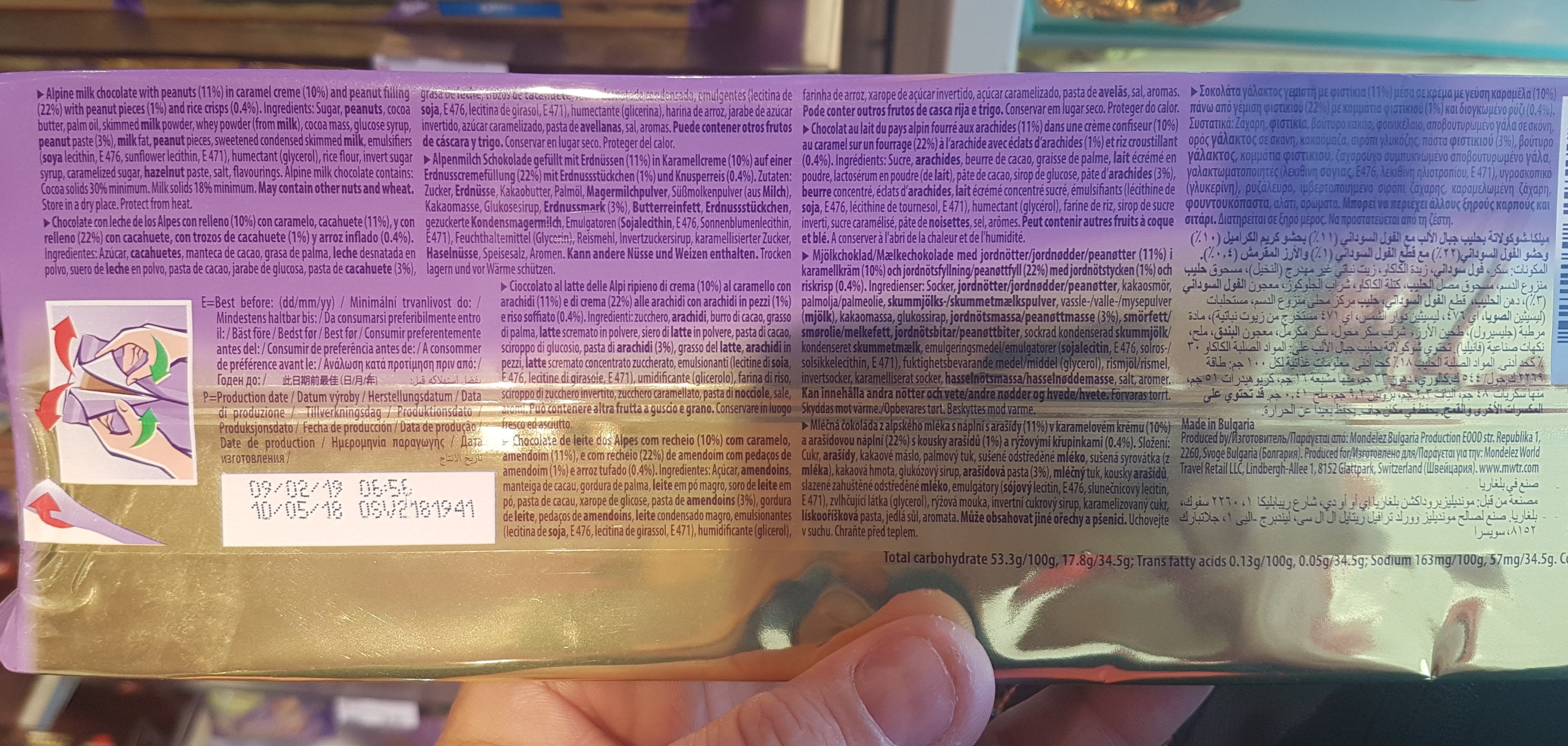Ajuda'ns a fer que la transparència alimentària sigui la norma!
Com a organització sense ànim de lucre, depenem de les vostres donacions per continuar informant els consumidors de tot el món sobre tot allò què mengen.
La revolució alimentària comença amb tu!
Milka Peanut caramel - 276g
Milka Peanut caramel - 276g
Aquesta pàgina del producte no està completa. Podeu ajudar a completar-la editant-la i afegint-hi més dades a partir de les fotos ja disponibles, o fent-ne més amb l'aplicació de androide o iPhone / iPad. Gràcies!
×
Codi de barres: 7622210629500 (EAN / EAN-13)
Quantitat: 276g
Marques: Milka
Categories: Snacks, Aperitius dolços, Cacau i derivats, Llaminadures, Xocolata, Xocolata amb llet
Matching with your preferences
Salut
Ingredients
-
24 ingredients
Francès: Sucre, arachides, beurre de cacao, graisse de palme, lait écrémé en poudre, lactosérum en poudre (de lait), pâte de cacao, sirop de glucose, pâte d'arachides (3%), beurre concentré, éclats d'arachides, lait écrémé concentré sucré, émulsifiants (lécithine de soja, E 476, lécithine de tournesol, E 471 humectant (glycérol), farine de riz, sirop de sucre inverti, sucre caramélisé, pâte de noisettes, sel, arômes, Peut contenir autresfruitsà coque et bléAl·lèrgens: en:Milk, en:Peanuts, en:SoybeansRastres: en:Gluten
Processament d'aliments
-
Aliments ultra processats
Elements que indiquen que el producte està al grup 4 - Aliments i begudes ultraprocessats:
- Additiu: E322 - Lecitines
- Additiu: E422 - Glicerol
- Additiu: E471 - Monoglicèrids i diglicèrids d'àcids grassos
- Additiu: E476 - Poliricinoleat de poligliceril
- Ingredient: Emulsionant
- Ingredient: Aromes
- Ingredient: Glucosa
- Ingredient: Xarop de glucosa
- Ingredient: Sucre invertit
- Ingredient: Sèrum de llet
Els productes alimentaris es classifiquen en 4 grups segons el seu grau de processament:
- Aliments no processats o mínimament processats
- Ingredients culinaris processats
- Aliments processats
- Aliments ultra processats
La determinació del grup es fa en funció de la categoria del producte i dels ingredients que conté.
Additius
-
E322 - Lecitines
Lecithin: Lecithin -UK: , US: , from the Greek lekithos, "egg yolk"- is a generic term to designate any group of yellow-brownish fatty substances occurring in animal and plant tissues, which are amphiphilic – they attract both water and fatty substances -and so are both hydrophilic and lipophilic-, and are used for smoothing food textures, dissolving powders -emulsifying-, homogenizing liquid mixtures, and repelling sticking materials.Lecithins are mixtures of glycerophospholipids including phosphatidylcholine, phosphatidylethanolamine, phosphatidylinositol, phosphatidylserine, and phosphatidic acid.Lecithin was first isolated in 1845 by the French chemist and pharmacist Theodore Gobley. In 1850, he named the phosphatidylcholine lécithine. Gobley originally isolated lecithin from egg yolk—λέκιθος lekithos is "egg yolk" in Ancient Greek—and established the complete chemical formula of phosphatidylcholine in 1874; in between, he had demonstrated the presence of lecithin in a variety of biological matters, including venous blood, in human lungs, bile, human brain tissue, fish eggs, fish roe, and chicken and sheep brain. Lecithin can easily be extracted chemically using solvents such as hexane, ethanol, acetone, petroleum ether, benzene, etc., or extraction can be done mechanically. It is usually available from sources such as soybeans, eggs, milk, marine sources, rapeseed, cottonseed, and sunflower. It has low solubility in water, but is an excellent emulsifier. In aqueous solution, its phospholipids can form either liposomes, bilayer sheets, micelles, or lamellar structures, depending on hydration and temperature. This results in a type of surfactant that usually is classified as amphipathic. Lecithin is sold as a food additive and dietary supplement. In cooking, it is sometimes used as an emulsifier and to prevent sticking, for example in nonstick cooking spray.Origen: Wikipedia (Anglès)
-
E322i - Lecitina
Lecithin: Lecithin -UK: , US: , from the Greek lekithos, "egg yolk"- is a generic term to designate any group of yellow-brownish fatty substances occurring in animal and plant tissues, which are amphiphilic – they attract both water and fatty substances -and so are both hydrophilic and lipophilic-, and are used for smoothing food textures, dissolving powders -emulsifying-, homogenizing liquid mixtures, and repelling sticking materials.Lecithins are mixtures of glycerophospholipids including phosphatidylcholine, phosphatidylethanolamine, phosphatidylinositol, phosphatidylserine, and phosphatidic acid.Lecithin was first isolated in 1845 by the French chemist and pharmacist Theodore Gobley. In 1850, he named the phosphatidylcholine lécithine. Gobley originally isolated lecithin from egg yolk—λέκιθος lekithos is "egg yolk" in Ancient Greek—and established the complete chemical formula of phosphatidylcholine in 1874; in between, he had demonstrated the presence of lecithin in a variety of biological matters, including venous blood, in human lungs, bile, human brain tissue, fish eggs, fish roe, and chicken and sheep brain. Lecithin can easily be extracted chemically using solvents such as hexane, ethanol, acetone, petroleum ether, benzene, etc., or extraction can be done mechanically. It is usually available from sources such as soybeans, eggs, milk, marine sources, rapeseed, cottonseed, and sunflower. It has low solubility in water, but is an excellent emulsifier. In aqueous solution, its phospholipids can form either liposomes, bilayer sheets, micelles, or lamellar structures, depending on hydration and temperature. This results in a type of surfactant that usually is classified as amphipathic. Lecithin is sold as a food additive and dietary supplement. In cooking, it is sometimes used as an emulsifier and to prevent sticking, for example in nonstick cooking spray.Origen: Wikipedia (Anglès)
-
E422 - Glicerol
Glycerol: Glycerol -; also called glycerine or glycerin; see spelling differences- is a simple polyol compound. It is a colorless, odorless, viscous liquid that is sweet-tasting and non-toxic. The glycerol backbone is found in all lipids known as triglycerides. It is widely used in the food industry as a sweetener and humectant and in pharmaceutical formulations. Glycerol has three hydroxyl groups that are responsible for its solubility in water and its hygroscopic nature.Origen: Wikipedia (Anglès)
-
E471 - Monoglicèrids i diglicèrids d'àcids grassos
Mono- and diglycerides of fatty acids: Mono- and diglycerides of fatty acids -E471- refers to a food additive composed of diglycerides and monoglycerides which is used as an emulsifier. This mixture is also sometimes referred to as partial glycerides.Origen: Wikipedia (Anglès)
-
E476 - Poliricinoleat de poligliceril
Polyglycerol polyricinoleate: Polyglycerol polyricinoleate -PGPR-, E476, is an emulsifier made from glycerol and fatty acids -usually from castor bean, but also from soybean oil-. In chocolate, compound chocolate and similar coatings, PGPR is mainly used with another substance like lecithin to reduce viscosity. It is used at low levels -below 0.5%-, and works by decreasing the friction between the solid particles -e.g. cacao, sugar, milk- in molten chocolate, reducing the yield stress so that it flows more easily, approaching the behaviour of a Newtonian fluid. It can also be used as an emulsifier in spreads and in salad dressings, or to improve the texture of baked goods. It is made up of a short chain of glycerol molecules connected by ether bonds, with ricinoleic acid side chains connected by ester bonds. PGPR is a yellowish, viscous liquid, and is strongly lipophilic: it is soluble in fats and oils and insoluble in water and ethanol.Origen: Wikipedia (Anglès)
Anàlisi dels ingredients
-
Oli de palma
Ingredients que contenen oli de palma: Greix de palma
-
No és vegà
Ingredients no vegans: Llet desnatada en pols, Xerigot en pols, en:Butterfat, Llet desnatada condensada ensucradaAlguns ingredients no s'han pogut reconèixer.
Necessitem la teva ajuda!
Podeu ajudar-nos a reconèixer més ingredients i analitzar millor la llista d'ingredients d'aquest producte i d'altres mitjançant:
- Editeu aquesta pàgina de producte per corregir les faltes d’ortografia de la llista d’ingredients i/o per eliminar els ingredients d’altres idiomes i frases que no estiguin relacionades amb els ingredients.
- Afegiu entrades, sinònims o traduccions noves a les nostres llistes multilingües d’ingredients, mètodes de processament d’ingredients i etiquetes.
Uniu-vos al canal #ingredients del nostre espai de discussió a Slack i/o apreneu sobre l'anàlisi dels ingredients en la nostra wiki, si voleu ajudar. Gràcies!
-
Es desconeix si és vegetarià
Ingredients no reconeguts: fr:e471-humectantAlguns ingredients no s'han pogut reconèixer.
Necessitem la teva ajuda!
Podeu ajudar-nos a reconèixer més ingredients i analitzar millor la llista d'ingredients d'aquest producte i d'altres mitjançant:
- Editeu aquesta pàgina de producte per corregir les faltes d’ortografia de la llista d’ingredients i/o per eliminar els ingredients d’altres idiomes i frases que no estiguin relacionades amb els ingredients.
- Afegiu entrades, sinònims o traduccions noves a les nostres llistes multilingües d’ingredients, mètodes de processament d’ingredients i etiquetes.
Uniu-vos al canal #ingredients del nostre espai de discussió a Slack i/o apreneu sobre l'anàlisi dels ingredients en la nostra wiki, si voleu ajudar. Gràcies!
-
Detalls de l'anàlisi dels ingredients
Necessitem la teva ajuda!
Alguns ingredients no s'han pogut reconèixer.
Necessitem la teva ajuda!
Podeu ajudar-nos a reconèixer més ingredients i analitzar millor la llista d'ingredients d'aquest producte i d'altres mitjançant:
- Editeu aquesta pàgina de producte per corregir les faltes d’ortografia de la llista d’ingredients i/o per eliminar els ingredients d’altres idiomes i frases que no estiguin relacionades amb els ingredients.
- Afegiu entrades, sinònims o traduccions noves a les nostres llistes multilingües d’ingredients, mètodes de processament d’ingredients i etiquetes.
Uniu-vos al canal #ingredients del nostre espai de discussió a Slack i/o apreneu sobre l'anàlisi dels ingredients en la nostra wiki, si voleu ajudar. Gràcies!
fr: Sucre, arachides, beurre de cacao, graisse de palme, lait écrémé en poudre, lactosérum en poudre, pâte de cacao, sirop de glucose, pâte d'arachides 3%, beurre concentré, arachides, lait écrémé concentré sucré, émulsifiants, lécithine de soja, e476, lécithine de tournesol, e471 humectant (glycérol), farine de riz, sirop de sucre inverti, sucre caramélisé, pâte de noisettes, sel, arômes- Sucre -> en:sugar - vegan: yes - vegetarian: yes - ciqual_proxy_food_code: 31016 - percent_min: 4.34782608695652 - percent_max: 76
- arachides -> en:peanut - vegan: yes - vegetarian: yes - ciqual_food_code: 15001 - percent_min: 3 - percent_max: 39.5
- beurre de cacao -> en:cocoa-butter - vegan: yes - vegetarian: yes - ciqual_food_code: 16030 - percent_min: 3 - percent_max: 27.3333333333333
- graisse de palme -> en:palm-fat - vegan: yes - vegetarian: yes - from_palm_oil: yes - ciqual_proxy_food_code: 16129 - percent_min: 3 - percent_max: 21.25
- lait écrémé en poudre -> en:skimmed-milk-powder - vegan: no - vegetarian: yes - ciqual_food_code: 19054 - percent_min: 3 - percent_max: 17.6
- lactosérum en poudre -> en:whey-powder - vegan: no - vegetarian: maybe - percent_min: 3 - percent_max: 15.1666666666667
- pâte de cacao -> en:cocoa-paste - vegan: yes - vegetarian: yes - ciqual_proxy_food_code: 16030 - percent_min: 3 - percent_max: 13.4285714285714
- sirop de glucose -> en:glucose-syrup - vegan: yes - vegetarian: yes - ciqual_proxy_food_code: 31016 - percent_min: 3 - percent_max: 12.125
- pâte d'arachides -> en:peanut-paste - vegan: yes - vegetarian: yes - ciqual_food_code: 15001 - percent_min: 3 - percent: 3 - percent_max: 3
- beurre concentré -> en:butterfat - vegan: no - vegetarian: yes - from_palm_oil: maybe - ciqual_food_code: 16401 - percent_min: 0 - percent_max: 3
- arachides -> en:peanut - vegan: yes - vegetarian: yes - ciqual_food_code: 15001 - percent_min: 0 - percent_max: 3
- lait écrémé concentré sucré -> en:sweetened-condensed-semi-skimmed-milk - vegan: no - vegetarian: yes - ciqual_proxy_food_code: 19051 - percent_min: 0 - percent_max: 3
- émulsifiants -> en:emulsifier - percent_min: 0 - percent_max: 3
- lécithine de soja -> en:soya-lecithin - vegan: yes - vegetarian: yes - ciqual_food_code: 42200 - percent_min: 0 - percent_max: 3
- e476 -> en:e476 - vegan: yes - vegetarian: yes - percent_min: 0 - percent_max: 3
- lécithine de tournesol -> en:sunflower-lecithin - vegan: yes - vegetarian: yes - percent_min: 0 - percent_max: 3
- e471 humectant -> fr:e471-humectant - percent_min: 0 - percent_max: 3
- glycérol -> en:e422 - vegan: maybe - vegetarian: maybe - percent_min: 0 - percent_max: 3
- farine de riz -> en:rice-flour - vegan: yes - vegetarian: yes - ciqual_food_code: 9520 - percent_min: 0 - percent_max: 3
- sirop de sucre inverti -> en:invert-sugar-syrup - vegan: yes - vegetarian: yes - percent_min: 0 - percent_max: 3
- sucre caramélisé -> en:caramelised-sugar - vegan: yes - vegetarian: yes - ciqual_proxy_food_code: 31016 - percent_min: 0 - percent_max: 3
- pâte de noisettes -> en:hazelnut-paste - vegan: yes - vegetarian: yes - ciqual_food_code: 15004 - percent_min: 0 - percent_max: 3
- sel -> en:salt - vegan: yes - vegetarian: yes - ciqual_food_code: 11058 - percent_min: 0 - percent_max: 0.41
- arômes -> en:flavouring - vegan: maybe - vegetarian: maybe - percent_min: 0 - percent_max: 0.41
Nutrició
-
Mala qualitat nutricional
⚠ ️Atenció: la quantitat de fruita, verdura i fruits secs no s'especifica a l'etiqueta, s'ha fet una estimació a partir de la llista d'ingredients: 24Aquest producte no es considera una beguda per al càlcul de la Nutri-Score.
Punts positius: 2
- Proteïnes: 5 / 5 (valor: 9.2, valor arrodonit: 9.2)
- Fibra: 2 / 5 (valor: 2.3, valor arrodonit: 2.3)
- Fruites, verdures, fruits secs i olis de colza/nou/oliva: 0 / 5 (valor: 24.25, valor arrodonit: 24.3)
Punts negatius: 27
- Energia: 6 / 10 (valor: 2276, valor arrodonit: 2276)
- Sucres: 10 / 10 (valor: 48, valor arrodonit: 48)
- Greixos saturats: 10 / 10 (valor: 16, valor arrodonit: 16)
- Sodi: 1 / 10 (valor: 164, valor arrodonit: 164)
Els punts per proteïnes no es compten perquè els punts negatius són més o iguals a 11.
Puntuació nutricional: (27 - 2)
Nutri-Score:
-
Nivells de nutrients
-
Greix en alta quantitat (33%)
Què us cal saber- Un alt consum de greixos, especialment de greixos saturats, pot augmentar el colesterol, que augmenta el risc de patir malalties del cor.
Recomanació: Reduïu el consum de greixos i greixos saturats- Trieu productes amb menys greixos i greixos saturats.
-
Àcid gras saturat en alta quantitat (16%)
Què us cal saber- Un alt consum de greixos, especialment de greixos saturats, pot augmentar el colesterol, que augmenta el risc de patir malalties del cor.
Recomanació: Reduïu el consum de greixos i greixos saturats- Trieu productes amb menys greixos i greixos saturats.
-
Sucre en alta quantitat (48%)
Què us cal saber- Un alt consum de sucre pot provocar augment de pes i càries dental. També augmenta el risc de patir diabetis tipus 2 i malalties cardiovasculars.
Recomanació: Limitau el consum de sucre i de begudes ensucrades- Les begudes ensucrades (com ara refrescos, begudes de fruites i sucs i nèctars de fruites) s'han de limitar tant com sigui possible (no més d'1 got al dia).
- Triau productes amb menor contingut de sucre i reduïu el consum de productes amb sucres afegits.
-
Sal comuna en Quantitat moderada (0.41%)
Què us cal saber- Un alt consum de sal (o sodi) pot provocar un augment de la pressió arterial, que pot augmentar el risc de patir malalties del cor i ictus.
- Moltes persones que tenen hipertensió no ho saben, ja que sovint no en tenen símptomes.
- La majoria de la gent consumeix massa sal (de 9 a 12 grams de mitjana al dia), al voltant del doble del nivell màxim d'ingesta recomanat.
Recomanació: Limitau la ingesta de sal i d'aliments rics en sal- Reduïu la sal que emprau quan cuinau, i no afegiu sal a taula.
- Limiteu el consum d'aperitius salats i trieu productes amb menor contingut de sal.
-
-
Informació nutricional
Informació nutricional Com es ven
per 100 g/100 mlComparat amb: Xocolata amb llet Energia 2.276 kj
(544 kcal)+1% Greix 33 g -2% Àcid gras saturat 16 g -15% Hidrats de carboni 51 g -3% Sucre 48 g +4% Fiber 2,3 g -9% Proteïna 9,2 g +23% Sal comuna 0,41 g +81% Fruits‚ vegetables‚ nuts and rapeseed‚ walnut and olive oils (estimate from ingredients list analysis) 24,25 %
Entorn
-
Eco-puntuació E - Impacte ambiental molt alt
El Eco-Score és una puntuació experimental que resumeix els impactes ambientals dels productes alimentaris.→ L'Eco-Score es va desenvolupar inicialment a França i s'està ampliant per a altres països europeus. La fórmula Eco-Score està subjecta a canvis, ja que es millora periòdicament per fer-la més precisa i més adequada per a cada país.Anàlisi del cicle de vida
-
Impacte mitjà dels productes de la mateixa categoria: D (Score: 38/100)
Categoria: Milk chocolate bar
Categoria: Milk chocolate bar
- Puntuació ambiental PEF ( petjada ambiental de l'aliment ): 0.78 (com més baixa sigui la puntuació, menor serà l'impacte)
- incloent l'impacte sobre el canvi climàtic: 12.74 kg CO₂ eq/kg del producte
Etapa Impacte Agricultura
43.5 %Processament
50.8 %Empaquetament
1.3 %Transport
3.7 %Distribució
0.6 %Consum
0.0 %
Bonificacions i punts negatius
-
Falta informació sobre l'origen dels ingredients
Punts negatius: -5
⚠ ️ L'origen dels ingredients d'aquest producte no està indicat.
Si estan indicats a l'embalatge, podeu modificar la fitxa del producte i afegir-los.
Si sou el fabricant d'aquest producte, podeu enviar-nos la informació amb la nostra plataforma gratuïta per a productors.
-
Ingredients que amenacen les espècies
Punts negatius: -10
Conté oli de palma
Els boscos tropicals d'Àsia, Àfrica i Amèrica Llatina es destrueixen per crear i ampliar les plantacions de palmera d'oli. La desforestació contribueix al canvi climàtic, i posa en perill espècies com l'orangutan, l'elefant pigmeu i el rinoceront de Sumatra.
-
Falta informació sobre l'embalatge d'aquest producte
Punts negatius: -15
⚠ ️ La informació sobre l'embalatge d'aquest producte no està completada.⚠ ️ Per a un càlcul més precís de l'Eco-Score, podeu modificar la pàgina del producte i afegir-los.
Si sou el fabricant d'aquest producte, podeu enviar-nos la informació amb la nostra plataforma gratuïta per a productors.
Eco-Score per a aquest producte
-
Impacte per a aquest producte: E (Score: 8/100)
Producte: Milka Peanut caramel - 276g
Puntuació de l'anàlisi del cicle de vida: 38
Suma de bonificacions i punts negatius: -30
Puntuació final: 8/100
-
Petjada de carboni
-
Equivalent a conduir 6.6 km en un cotxe de gasolina
1274 g de CO² per cada 100 g de producte
La xifra d'emissions de carboni prové de la base de dades Agribalyse d'ADEME, per a la categoria: Milk chocolate bar (Font: Base de dades ADEME Agribalyse)
Etapa Impacte Agricultura
31.2 %Processament
65.4 %Empaquetament
0.8 %Transport
2.4 %Distribució
0.1 %Consum
0.0 %
Empaquetament
-
Falta informació sobre l'embalatge d'aquest producte
⚠ ️ La informació sobre l'embalatge d'aquest producte no està completada.Take a photo of the recycling information Take a photo of the recycling information
Transport
-
Orígens dels ingredients
Falta informació sobre l'origen dels ingredients
⚠ ️ L'origen dels ingredients d'aquest producte no està indicat.
Si estan indicats a l'embalatge, podeu modificar la fitxa del producte i afegir-los.
Si sou el fabricant d'aquest producte, podeu enviar-nos la informació amb la nostra plataforma gratuïta per a productors.Add the origins of ingredients for this product Add the origins of ingredients for this product
Espècies amenaçades
-
Conté oli de palma
Fomenta la desforestació i amenaça espècies com l'orangutan
Els boscos tropicals d'Àsia, Àfrica i Amèrica Llatina es destrueixen per crear i ampliar les plantacions de palmera d'oli. La desforestació contribueix al canvi climàtic, i posa en perill espècies com l'orangutan, l'elefant pigmeu i el rinoceront de Sumatra.
Report a problem
-
Incomplete or incorrect information?
Category, labels, ingredients, allergens, nutritional information, photos etc.
If the information does not match the information on the packaging, please complete or correct it. Open Food Facts is a collaborative database, and every contribution is useful for all.
Fonts de dades
Producte afegit per kiliweb
Última modificació de la pàgina del producte per foodless.
La pàgina del producte, també editada per elcoco, inf, musarana, openfoodfacts-contributors, quechoisir, roboto-app, thaialagata, trsgpxtx.










